Glitchy, Boring and Dumb
Trump’s return to Twitter was an embarrassing affair.
Remember when Elon Musk hosted Ron DeSantis’s campaign launch, but the technical glitches became a metaphor for his doomed campaign? You’d think that GOP presidential candidates would have learned by now that getting Musk’s blessing and then going on his glitchy platform is a dicey and potentially embarrassing gamble. Using Trump’s own words, with a slight tweak:
The Trump campaign was apparently unconcerned. Musk invited the ex-president on to Twitter Spaces (yes, I still call it Twitter) to revive his flagging campaign, hyping the “interview” as a meeting of two titans of industry and politics. What happened instead was a technical fiasco followed by a cringe-inducing love fest between two men who both think they are very smart, while actually smart people see right through them.
Even before the session began, it ran into headwinds. The European Union issued an unusual warning to Musk not to allow the spread of misinformation arising from the event with Trump. And Trump’s investors on Truth Social, already unhappy about its recent disastrous earnings report, were left wondering if Trump would abandon their company in favor of Musk’s.
Then there was the odd fact that Trump sounded like he had a pronounced lisp throughout the session. I’ll explain what I think happened with that below.
In today’s piece, I’ll discuss Trump’s decision to sit down with Musk on Twitter and what it signals, as well as the concerns it has raised. I’ll then briefly touch on the technical problems because, well, it’s just kind of fun to talk about how this was yet another unmitigated disaster. Finally, I’ll talk about some of the weirder things that came up that people have been discussing online as evidence both men should be nowhere near the levers of power.
Back to Twitter?
To understand what’s at stake and the signals Trump is sending, we need to rewind to when Trump was still active on that site.
A great deal of Trump’s power and ability to get his message out arose from his Twitter account, where he had amassed more than 80 million followers, though how many were real people isn’t clear. A lot of that power went away when Twitter banned Trump in 2021 for promoting violence at the Capitol on January 6.
Trump decided he was tired of being subject to the rules of other platforms like Twitter or Facebook, where he was also suspended, so he set up his own social media company, Truth Social, which, despite having no profits and in fact losing a lot of money every quarter, went public earlier this year.
Twitter lifted Trump’s ban in 2022, but Trump remained silent there, with the exception of a single post in 2023 containing his mugshot and a link to his campaign’s website and an interview he gave to Tucker Carlson, the disgraced former Fox anchor who now streams his new program on Twitter.
That’s why it was alarming to many to see Musk platform Trump with a one-on-one streamed conversation—it was by no means an “interview” despite what Musk called it—and then to see Trump begin to tweet frequently throughout the day leading up to the event. In all, Trump tweeted eight times, mostly reposting campaign videos. He also began to advertise again with Musk, which could be a kind of tit-for-tat for Musk having hosted him on Twitter Spaces.
European Union warning
Before the session began, the EU sent a formal letter to Musk demanding that he comply with the terms of the Digital Services Act (DSA) and prevent the amplification of misinformation during the Trump livestream. The EU Commissioner added an admonition, reminding Musk, “With great audience comes greater responsibility #DSA”
The letter had come on the heels of Musk’s reposting of false reports in the UK about migrants that stoked unrest and racial violence around the country; his spreading of false information that the UK was going to open detainment camps for rioters; and his statements about Muslim ex-First Minister of Scotland Humza Yousaf, where Musk claimed, “Scotland gave him everything and yet he loathes white people.”
Back in July, the EU had already charged X for failing to respect its social media laws, and the company was facing millions in fines.
Musk responded childishly, posting a meme that said, “Take a big step back and literally f*ck your own face.”
A third of Twitter’s 300 million users reside in the EU.
Truth Social tanking
Trump’s social media company, trading under the symbol DJT, had already reported weak earnings and steep losses. On top of that news, it was clear from earlier in the day that Trump had begun tweeting again.
As part of his deal and responsibilities as Truth Social’s major stakeholder, Trump had more or less agreed not to post on other platforms. This is good if you’re a Truth Social investor, as most of the engagement on that platform is around Trump and his posts. Were he to begin to focus elsewhere, his followers would likely jump ship.
The stock responded to this twin set of bad news by falling over five percent, and down another nearly six percent as of the time of this writing. Here is a chart I snapped of its five day trend:
It isn’t clear whether Trump will continue to tweet, or if the harm to his own significant fortune, at least on paper, will deter him.
How the glitch stole an early Xmas
In the upcoming election, Trump hopes to run up his numbers among disaffected male voters who are on Twitch, gaming communities, and platforms such as Twitter and Truth Social. A good example of his strategy is his recent appearance with right-wing extremist and streamer Adin Ross, who was deplatformed from Twitch for hate speech and who has hosted other rapists besides Trump such as Andrew Tate and other white nationalists like Nick Fuentes.
Ross was able to conduct his livestream with Trump with no major technical issues, but not so the billionaire Elon Musk, who is supposed to be a tech guru. When Twitter Spaces crashed again, Musk was quick to blame a “distributed denial-of-service” or “DDoS” attack, with conspiracies immediately abounding.
The Trump camp leaned into the conspiracies, with new RNC co-chair Lara Trump blaming “the Deep State” for the mishaps.
Some technical experts were quick to point out that the rest of the Twitter platform remained functional throughout the alleged attack, and other Twitter Spaces were fine, too. This would have been a heretofore unknown type of DDoS attack that somehow targeted only those Twitter servers hosting the Trump session, a highly unlikely and unprecedented development. One X staffer remarked there was a “99 percent” chance Elon was lying about an attack.
Perhaps instead of blaming hackers or the Deep State, Musk simply shouldn’t have fired most of his tech workforce before trying to host a livestream with that many attendees.
The problems were finally resolved some 42 minutes later. The Harris campaign’s response to this ineptitude (along with the bizarre nature of the conversation) was pitch perfect:
The lisp heard round the world
The problems continued as over a million people heard Trump lisp his way through the entire session. Social media exploded with many asking whether Trump was really okay.
You can hear examples of the apparent speech issue here.
The Trump campaign only made things worse by telling off reporters who inquired about what was going on. Responding to a question about the lisp from a Huffington Post reporter, the Trump campaign shot back in an email, “Must be your sh*tty hearing. Get your ears checked.”
My own theory about the lisp is less interesting and comes from experience with podcasting and microphones. Sometimes an audio compression issue can produce a distinct lisp on a mic or a recording that wasn’t present in person. This actually happened to me recently as I recorded an interview with my brother Kaiser’s Sinica podcast. Given that much of the subject matter was the birth of the gay community in Beijing, we decided a pronounced lisp would not serve the interview well. So I re-recorded it.
Such a basic audio issue shouldn’t be happening during an important livestream of a presidential candidate on a major platform like Twitter, but here we are. Because of incompetence and technical glitches, the biggest stories coming out of the event are how it started 42 minutes late and how Trump sounded like Sylvester the Cat the whole time.
Weird, dangerous and dull
It is fair to say that nothing new or of much substance was covered yesterday, with the two men shamelessly fawning over and congratulating each other for most of the session. Trump, per usual, drifted often into nonsensical ramblings. If Trump was hoping for a reset of his flailing campaign, this wasn’t it.
As Washington Post noted of Musk’s session,
[D]uring much of the discussion, he focused on comfortable topics for Trump, such as undocumented immigration. He also allowed the former president to deliver his preferred talking points and a stream of false statements, giving the chat some of the hallmarks of Trump’s signature campaign rallies.
Trump reiterated that criticism of Harris on the X Space and repeated his frequent claim that Harris’s rise to the top of the Democratic ticket amounted to a “coup.”
During Monday’s conversation, Trump portrayed Harris as the “border czar” (Though Biden asked Harris to negotiate with Central American countries to help address the root causes of migration, he never put her in charge of border policy) and criticized her limited access to questions from the press. He continued to mispronounce Harris’s first name, a move critics have suggested is an attempt to “other” her, and suggested she would be unable to negotiate with world leaders.
Even the NYT was uncharacteristically negative in its critique of Trump’s performance and Musk’s platforming of it.
Over the course of more than two hours, Mr. Trump attacked Vice President Kamala Harris, his Democratic opponent, as a “phony” who, along with President Biden, failed to address crossings at the U.S. border with Mexico. He repeated a number of false claims, including that the 2020 election was rigged, the criminal cases against him were a conspiracy by the Biden administration to undermine his candidacy and the leaders of other nations were deliberately sending criminals and “their nonproductive people” to America.
To all of these points, Mr. Musk largely voiced his agreement, offering frequent praise as he proved a sympathetic partner to help amplify Mr. Trump’s views on a social-media platform that once barred him for promoting false claims that promoted political violence.
Personally, I had two WTF moments over new lies and horrors Trump and Musk said.
First, as a lover and proponent of high speed trains, it irked me to hear Trump condemn the U.S. for not having any yet. “We don’t have anything like that in our country. It doesn’t make sense that we don’t,” he told Musk. But it was Trump who canceled nearly $1 billion in high-speed rail funding in California. I’m with this guy here:
Second, my team has just finished working with George Takei to help amplify the tragic loss of life during the bombings of Hiroshima and Nagasaki 79 years ago this week, so it was really something else to hear Trump and Musk discuss how it’s “great” that those cities are now rebuilt and that it’s “not as scary as some people think.” See? Nuclear war is something we can get past!
My takeaway is that these are two deeply unserious and uninformed people who sadly have enormous platforms to spread their idiocy. But as The Atlantic piece about last night’s debacle aptly noted,
Trump’s earnest return ought to have been a triumphant moment—not just for him, but for Musk and his platform. Instead, it had the opposite effect, making both men seem small, siloed in their own safe space, and performing for a homefield audience of overly online supporters.
As the Harris/Walz campaign works to expand its appeal and present a positive and hopeful message, the grievances, bile and smallness of Trump/Vance (or here, Trump/Musk) will grow more evident.
And if last night’s low energy, mutual adoration session is any indication of what Trump intends to bring for the remainder of the campaign, the Harris/Walz lead in polling will soon bake itself in. Trump may come to learn that targeting the angry, male internet vote isn’t a game changer, let alone a game winner.


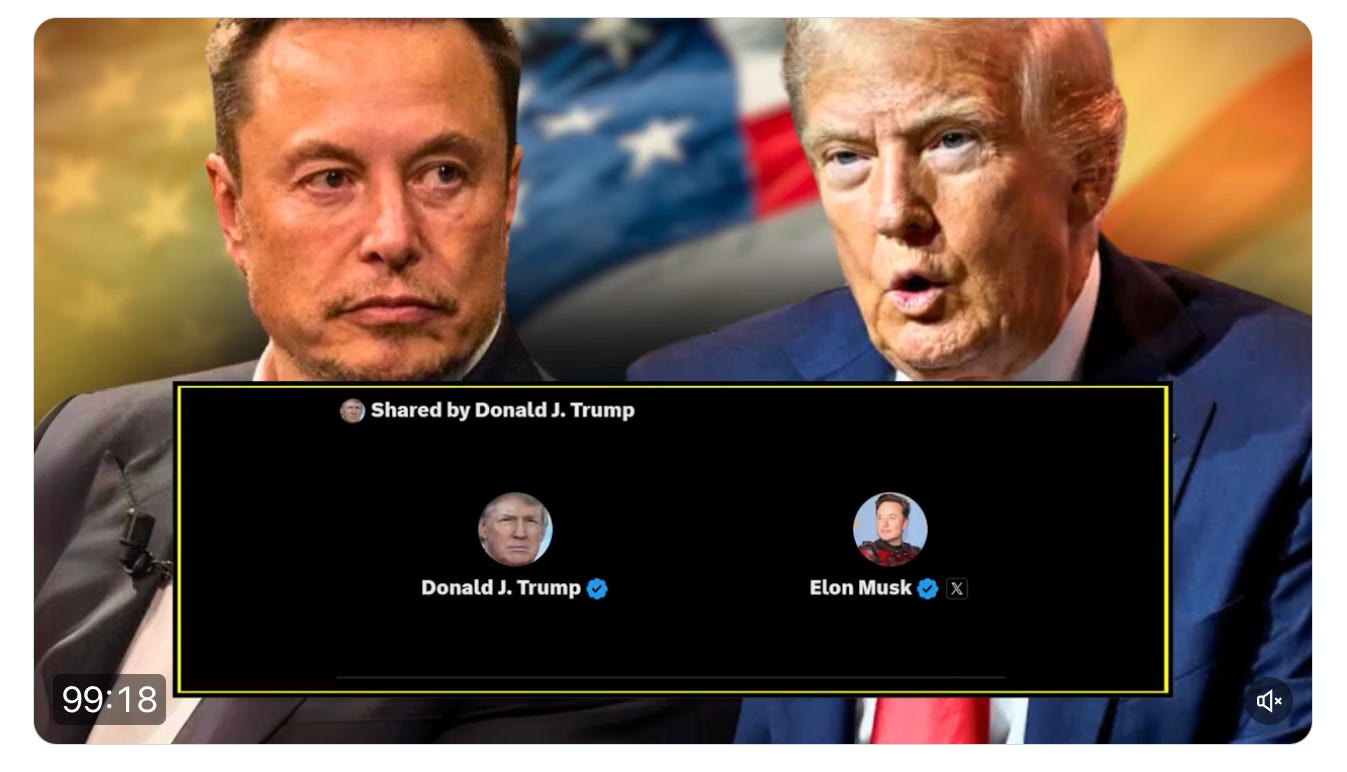
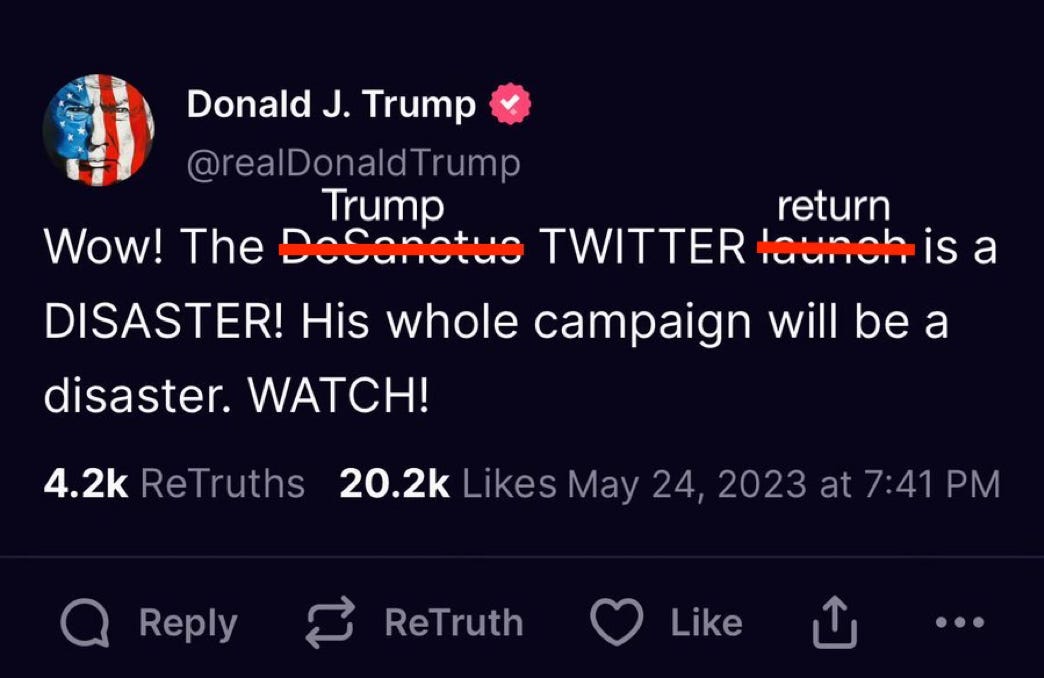
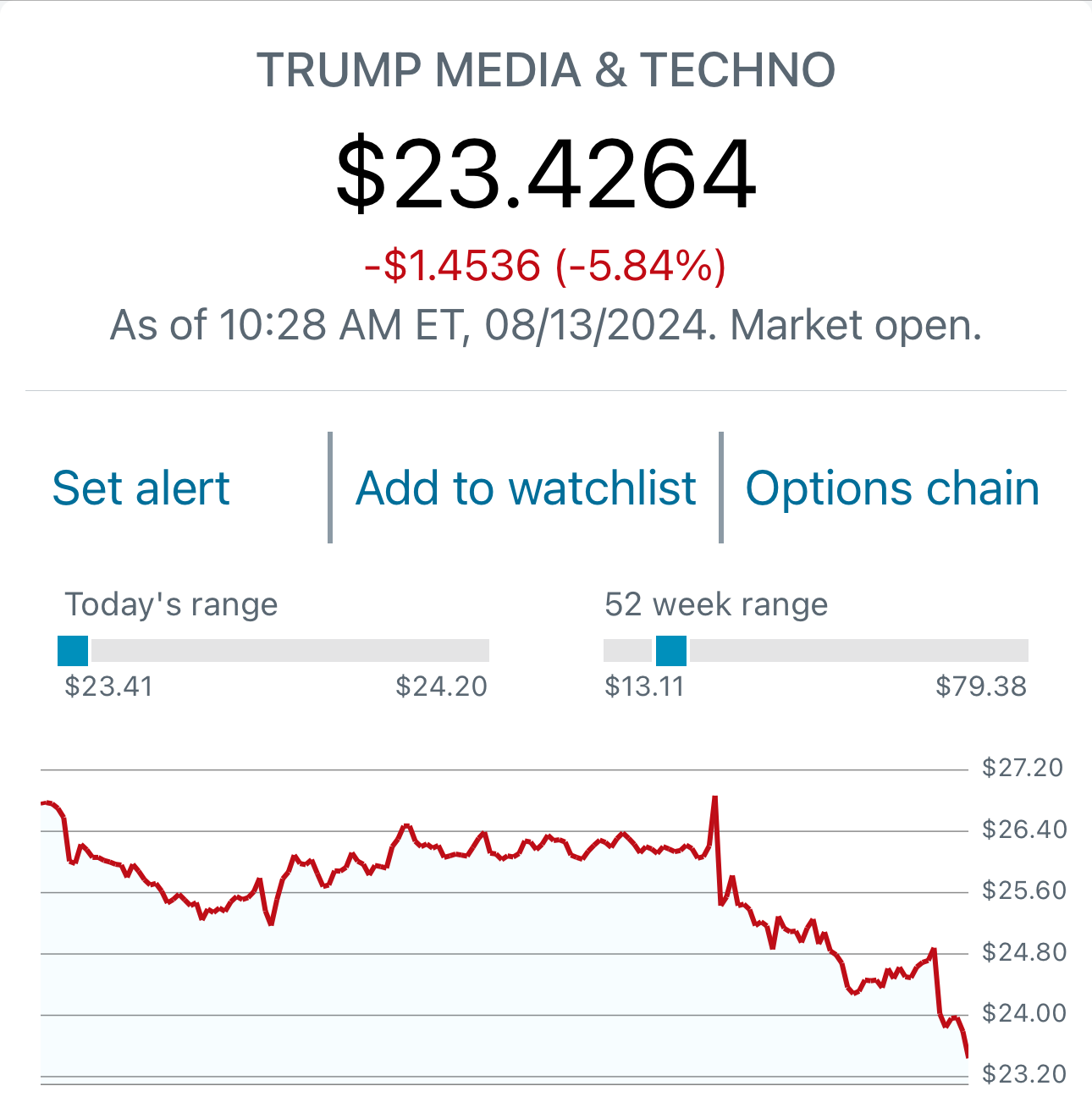
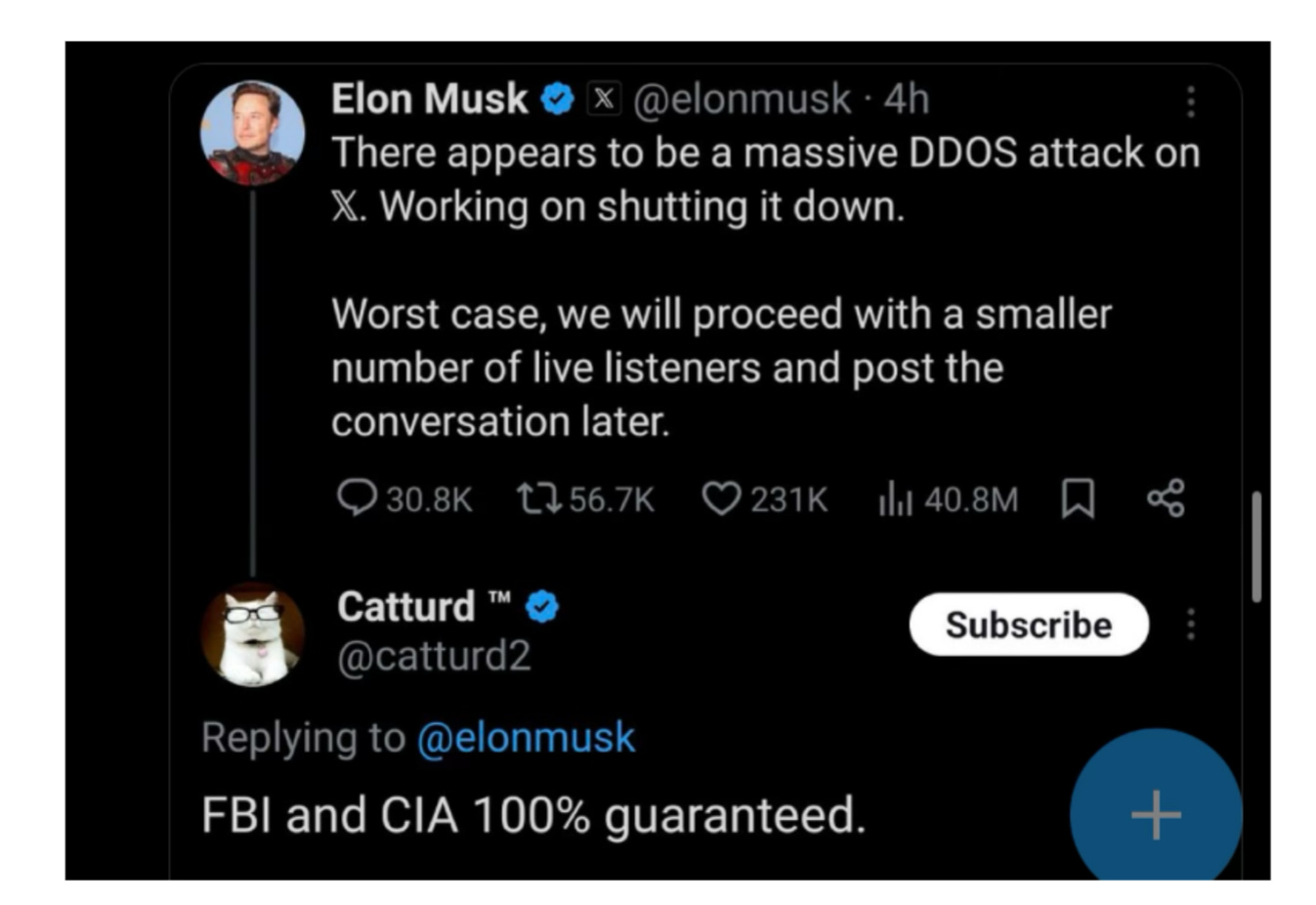
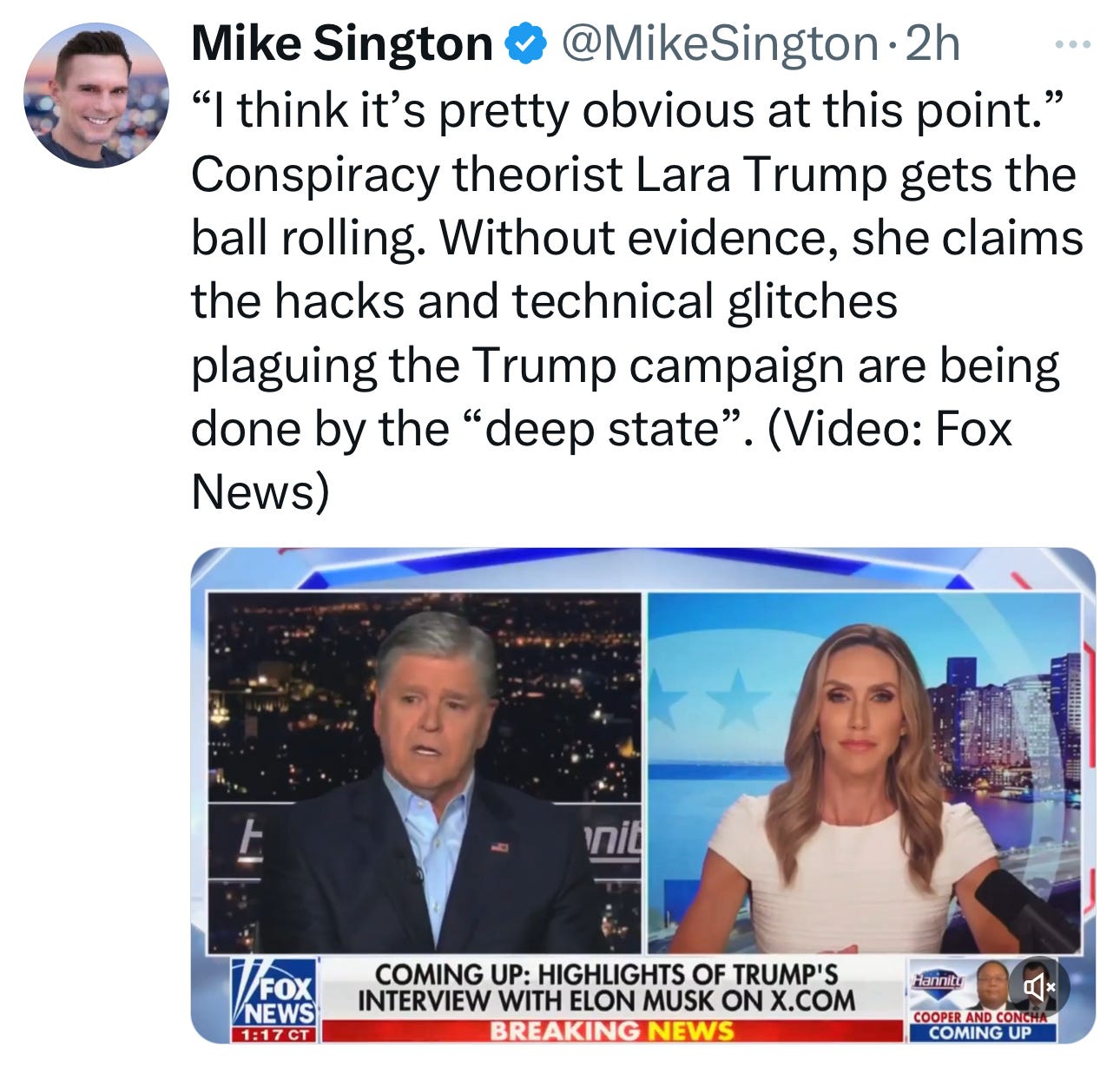
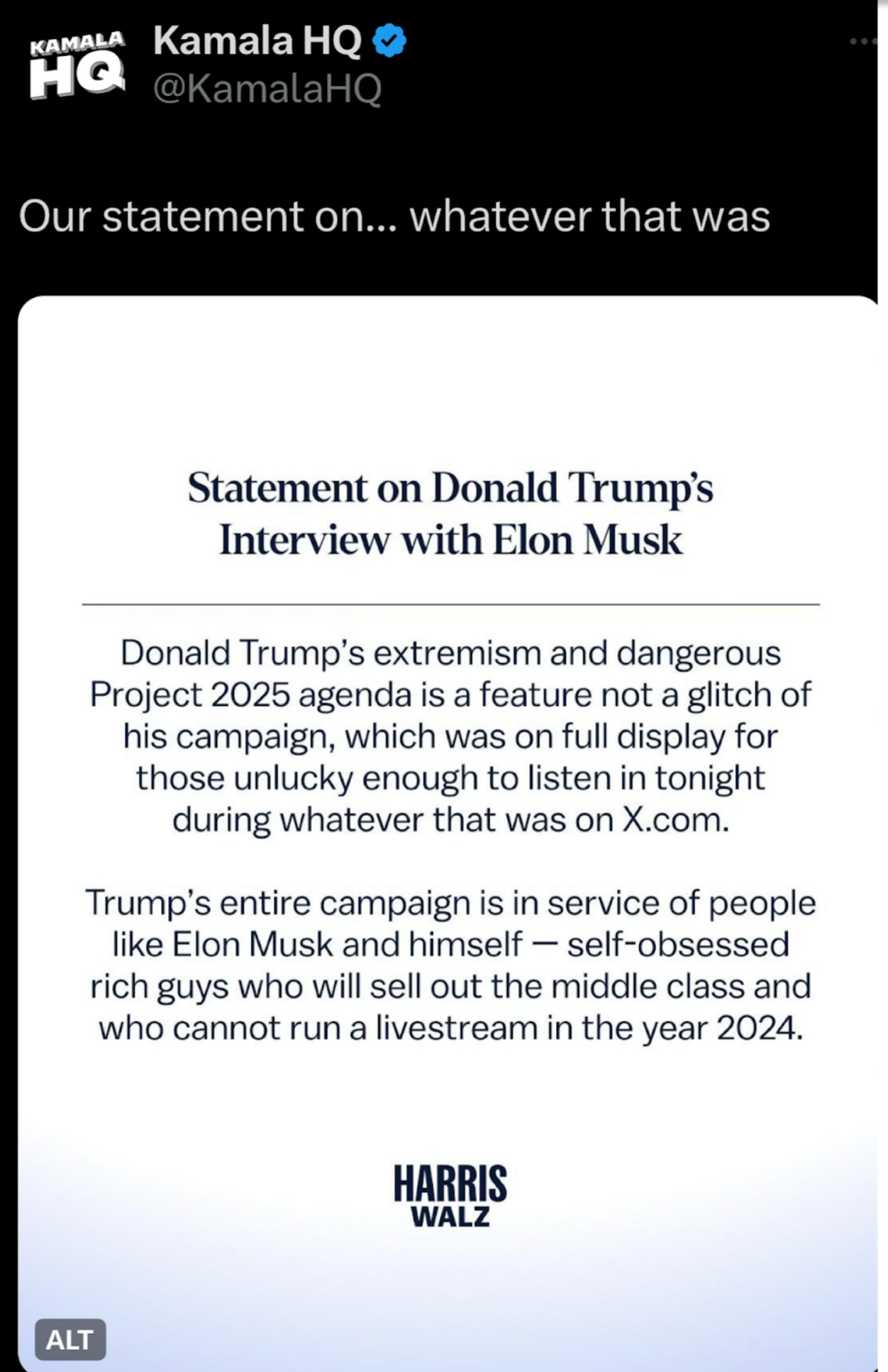
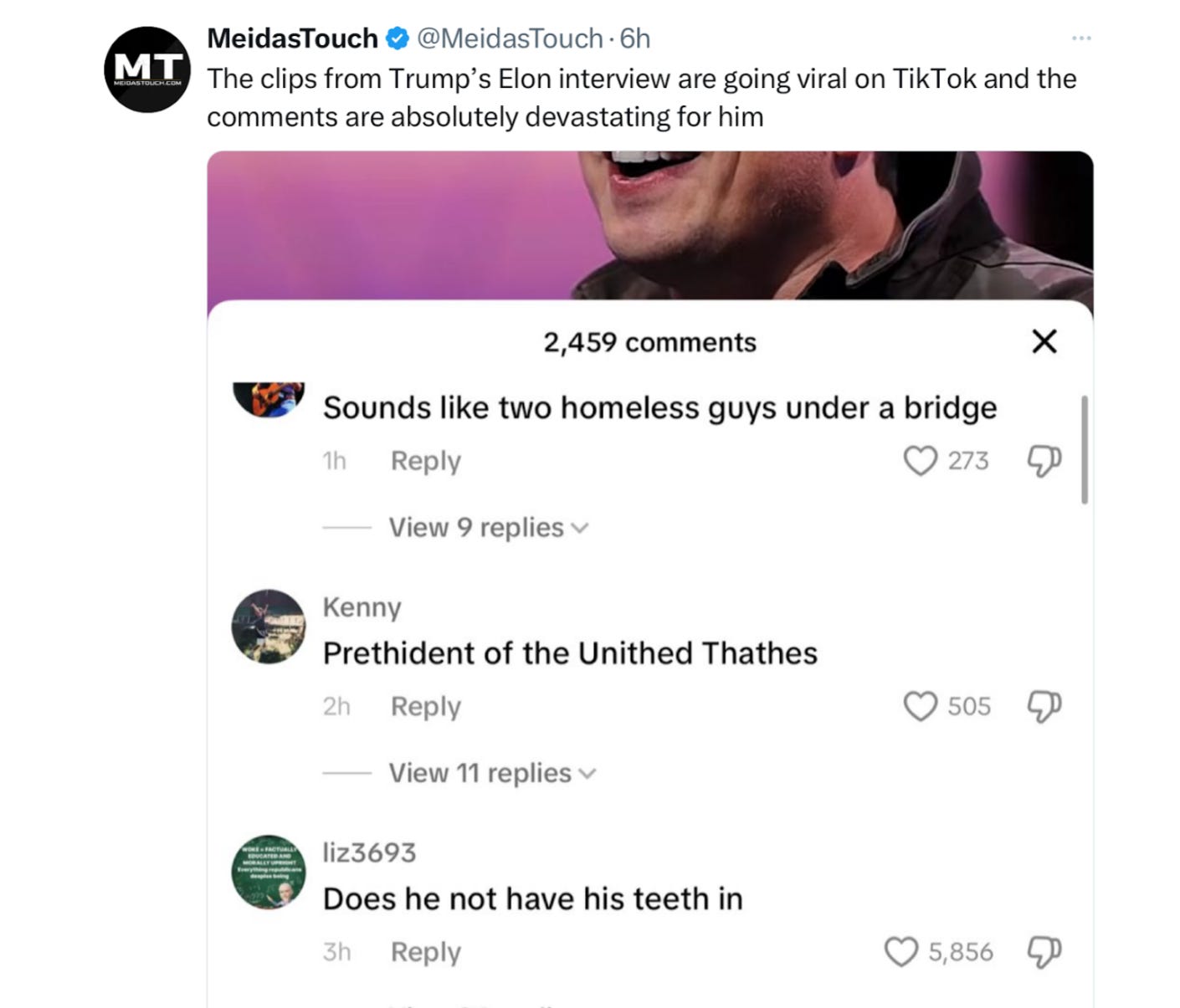
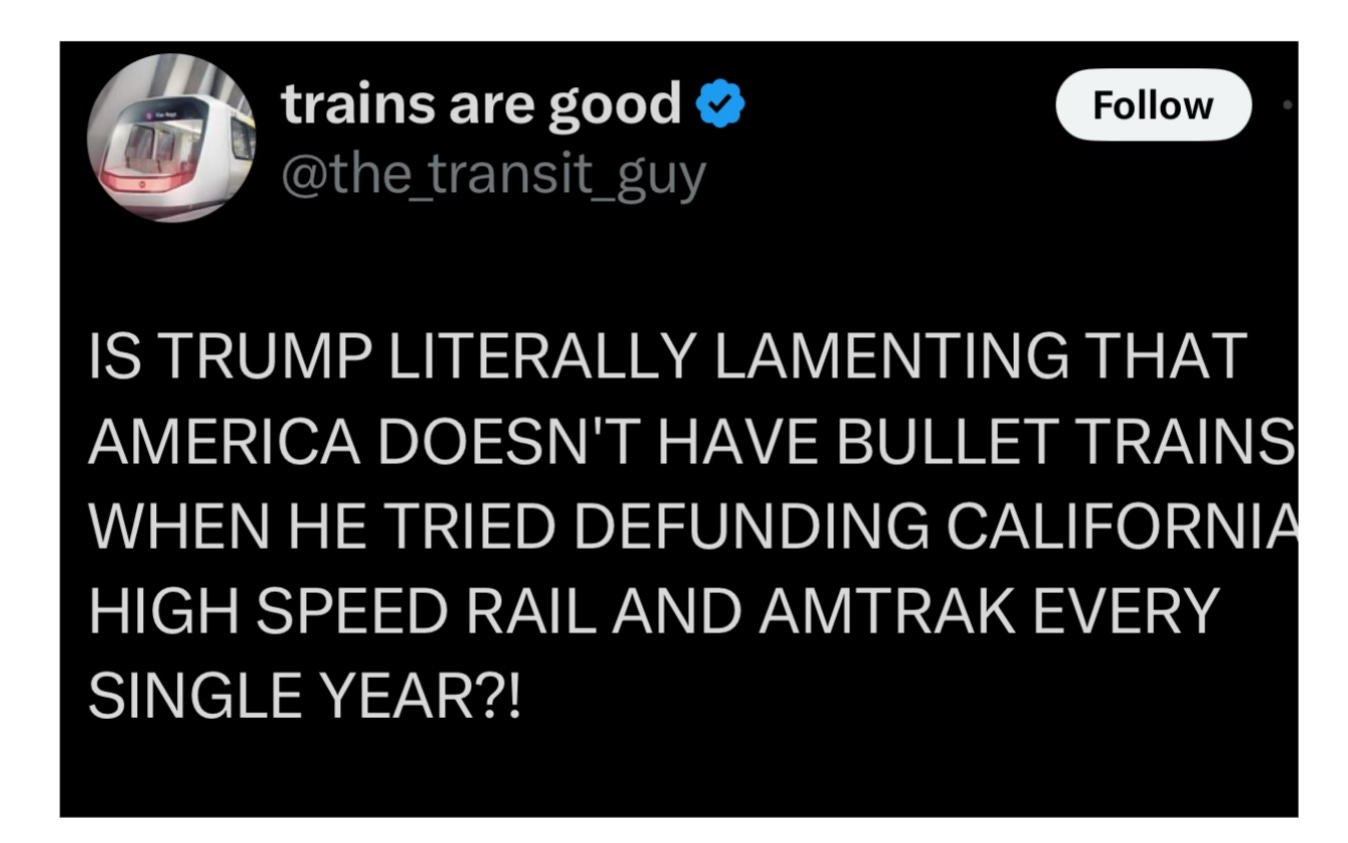
My favorite part was when trump congratulated musk for wanting to fire striking workers, or workers who wanted to unionize - AND then today the UAW sued them both for it.
https://www.fox2detroit.com/news/uaw-sues-trump-musk-accusing-them-pushing-fire-striking-workers
Never a dull moment!
Well, there might be an innocent explanation for Trump’s total inability to speak like anything resembling a normal person, but I was under the impression that speech problems were worthy of a month of front pages speculating on whether the senior citizen running for president is up to the job. I must be missing some extremely deep journalistic principle—I only spent 33 years in newsrooms, so I don’t know much.